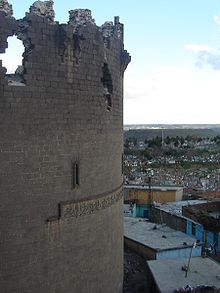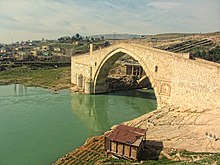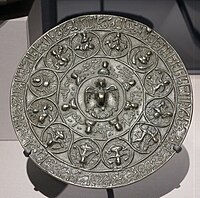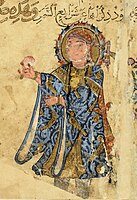| Artuqid StateArtuklu Beyliği | |||||||||||
|---|---|---|---|---|---|---|---|---|---|---|---|
| 1102–1409 | |||||||||||
 | |||||||||||
| Capital | Hasankeyf, Diyarbakır, Harput, Mardin, in chronological order | ||||||||||
| Common languages | Turkish, Arabic, Syriac | ||||||||||
| Religion | Sunni Islam | ||||||||||
| Government | Beylik | ||||||||||
| Bey | |||||||||||
| History | |||||||||||
| • Establishment | 1102 | ||||||||||
| • Takeover by Zengid Dynasty (Aleppo) | 1127 | ||||||||||
| • Vassal of the Ayyubid Sultanate (Hasenkeyf) | 1232 | ||||||||||
| • Takeover by Sultanate of Rum (Harput) | 1234 | ||||||||||
| • Annexation by Kara Koyunlu (Mardin) | 1409 | ||||||||||
| Currency | dinar | ||||||||||
| |||||||||||
| Today part of | Syria Turkey | ||||||||||
The Artuqid dynasty (alternatively Artukid, Ortoqid, or Ortokid; Turkish: Artuklu Beyliği, Artuklular, pl. Artukoğulları; Turkmen: Artykly begligi, Artykogullary; Azerbaijani: Artuklu bəyliyi, Artıqlılar) was established in 1102 as an Anatolian Beylik (Principality) of the Seljuk Empire. It formed a Turkoman dynasty rooted in the Oghuz Döğer tribe, and followed the Sunni Muslim faith. It ruled in eastern Anatolia, Northern Syria and Northern Iraq in the eleventh through thirteenth centuries. The Artuqid dynasty took its name from its founder, Artuk Bey, who was of the Döger branch of the Oghuz Turks and ruled one of the Turkmen beyliks of the Seljuk Empire. Artuk's sons and descendants ruled the three branches in the region: Sökmen's descendants ruled the region around Hasankeyf between 1102 and 1231; Ilghazi's branch ruled from Mardin and Mayyafariqin between 1106 and 1186 (until 1409 as vassals) and Aleppo from 1117–1128; and the Harput line starting in 1112 under the Sökmen branch, and was independent between 1185 and 1233.
History

The dynasty was founded by Artuk, son of Eksük, a general originally under Malik-Shah I and then under the Seljuk emir of Damascus, Tutush I. Tutush appointed Artuk governor of Jerusalem in 1086. Artuk died in 1091, and was succeeded by his sons Sökmen and Ilghazi who were expelled from Jerusalem by the Fatimid vizier al-Afdal Shahanshah in 1098; the Fatimids lost the city to the Crusaders the following year after the siege of Jerusalem of 1099.
Sökmen and Ilghazi established themselves in Diyarbakır, Mardin, and Hasankeyf in al-Jazira where they came into conflict with the Seljuk sultanate. Sökmen, bey of Mardin, defeated the Crusaders at the Battle of Harran in 1104. Ilghazi succeeded Sökmen in Mardin and imposed his control over Aleppo at the request of the qadi Ibn al-Khashshab in 1118. The next year, Ilghazi defeated the Crusader state Principality of Antioch at the Battle of Ager Sanguinis of 1119.

After pillaging the County of Edessa, Ilghazi made peace with the Crusaders. In 1121, he went north towards Armenia with his son-in-law Mazyad Dubais II ibn Sadaqah and Sultan Malik of Ganja. Ilghazi invaded Georgia and was defeated by David IV of Georgia at the Battle of Didgori of 1121. Ilghazi died in 1122, and although his nephew Belek Ghazi nominally controlled Aleppo, the city was really controlled by ibn al-Khashshab. Ibn al-Kashshab was murdered by Assassins in 1125, and Aleppo fell under the control of Zengi, atabeg of Mosul, in 1128. After the death of Belek Ghazi, the Artuqids were split between Harput, Hasankeyf and Mardin. Sokman's son Rukn al-Dawla Dāʾūd, bey of Hasankeyf, died in 1144, and was succeeded by his son Kara Aslan. Kara Aslan allied with Joscelin II of Edessa against the Zengids, and while Joscelin was away in 1144, Zengi recaptured Edessa, the first of the Crusader states to fall (see Siege of Edessa). The Artuqids became vassals of the Zengids during the reign of Nur al-Din Zengi (r. 1146–1174).
Kara Aslan's son Nūr al-Dīn Muḥammad allied with the Ayyubid sultan Saladin against Kilij Arslan II, Seljuk sultan of Rûm, whose daughter had married Nur ad-Din Muhammad. In the peace settlement with Kilij Arslan II, Saladin gained control of the Artuqid territory, even though the Artuqids were still technically vassals of Mosul, which Saladin did not control. The Seljuk Empire completely disintegrated soon after that in 1194.
The Artuqid dynasty remained in nominal command of al-Jazira, but their power declined under Ayyubid rule. The Hasankeyf branch conquered Diyarbakır in 1198 and its center was moved here, but was demolished by the Ayyubids in 1231 when it attempted to form an alliance with the Seljuks. The Harput branch was destroyed by the Sultanate of Rum due to following a slippery policy between the Ayyubids and Seljuqs. The Mardin branch survived for longer, but as a vassal of the Ayyubids, Sultanate of Rûm, Il-Khanate and the Timurids. Qara Arslan (r.1260-1292), ruler of Mardin, submitted to the Mongol Hulegu. The Kara Koyunlu captured Mardin and finally put an end to Artuqid rule in 1409.
Art

Despite their constant preoccupation with war, members of the Artuqid dynasty left many architectural monuments. Artuqid rulers commissioned many public buildings, such as mosques, bazaars, bridges, hospitals and baths for the benefit of their subjects. They left an important cultural heritage by contributing to literature and the art of metalworking. The door and door handles of the great Mosque of Cizre are unique examples of Artuqid metal working craftsmanship, which can be seen in the Turkish and Islamic Arts Museum in Istanbul, Turkey.
They made the most significant additions to Diyarbakır City Walls. Urfa Gate was rebuilt by Muhammad, son of Kara Arslan. In the same area of the western wall, south of Urfa Gate, two imposing towers, Ulu Beden and Yedi Kardeş were commissioned in 1208 by the Artuqid ruler Nāṣir al-Dīn Maḥmūd who designed the Yedi Kardeş tower himself and apposed the Artuqid double-headed eagle on its walls.
A large caravanserai in Mardin as well as the civil engineering feat of Malabadi Bridge are still in regular use in our day. The partially standing Old Bridge, Hasankeyf, was built in 1116 by Kara Arslan.
The Great Mosques of Mardin and Silvan were possibly but in any case considerably developed over the 12th century by several Artuqid rulers on the basis of existing Seljuk edifices. The congregational mosque of Dunaysir (now Kızıltepe) was commissioned by Yülük Arslan (1184–1203) and completed after his death in 1204 by his brother Artuk Arslan (1203–1239).
-
 Magic Mirror of Abu-l-Fadl Artuq Shah of Harput, Eastern Anatolia, ca. 1220-30, David Collection. It is "representative of medieval Islamic examples of the “Chinese” type".
Magic Mirror of Abu-l-Fadl Artuq Shah of Harput, Eastern Anatolia, ca. 1220-30, David Collection. It is "representative of medieval Islamic examples of the “Chinese” type".
-
 Basin of Sultan Qara Arslan b. Il-Ghazi, Jazira, Syria, or Egypt, late 13th cen. (1289-92) MIA, Doha.
Basin of Sultan Qara Arslan b. Il-Ghazi, Jazira, Syria, or Egypt, late 13th cen. (1289-92) MIA, Doha.
-
 Figurative Architectural Piece Turkish and Islamic Arts Museum, Istanbul
Figurative Architectural Piece Turkish and Islamic Arts Museum, Istanbul
Literature
The Artuqids are known for their sponsoring of literary works in Arabic. A copy of al-Sufi's book on astronomy The Book of Fixed Stars, a synthesis of Ptolemy's Almagest and Arabic astronomical traditions, was made in 1131 in Artuqid Mardin. Kara Arslan (1148–1174 CE) commissioned a new Arabic translation of De Materia Medica by an Arab Christian author named Abu Salim al-Malti, probably from Malatya.
The Artuqid ruler Nasr al-Din Mahmud (r. 1201–1222) is known to have commissioned an edition of the Al-Jāmi‘ fī ṣinā‘at al-ḥiyal of Ibn al-Razzaz al-Jazari, devoted to the depiction of mechanical devices, in April 1206 at the Artuqid court (Ahmet III 3472, Topkapı Sarayı Library). The miniatures are thought to reflect various aspects of the Artuqid court at the time. Ibn al-Razzaz al-Jazari was employed at the Artuqid court during the last quarter of the 12th century, and this is the earliest known manuscript of his opus. Many of the figures in the manuscript wear the characteristic Turkic dress, with long coat and boots, and the sharbush headgear (of a special type seen only in Artuqid manuscripts, with a very tall cap behind the headplate and the limited usage of fur around the rim).
An early edition of the Maqamat al-Hariri (Bibliothèque Nationale de France, Arabe 3929) is also considered as probably belonging to the same Artuqid school of painting.
-
 "Sign of Sagittarius" by al-Sufi in his book Ṣuwar al-kawākib al-thābita, Artuqid Mardin, 1131 CE (TSMK, A. 3493).
"Sign of Sagittarius" by al-Sufi in his book Ṣuwar al-kawākib al-thābita, Artuqid Mardin, 1131 CE (TSMK, A. 3493).
-
 Court scene. Amid, modern-day Diyarbakır, Turkey, 1206 (Ms. Ahmet III 3472).
Court scene. Amid, modern-day Diyarbakır, Turkey, 1206 (Ms. Ahmet III 3472).
-
 Turkic figure. Amid, modern-day Diyarbakır, Turkey, 1206 (Ms. Ahmet III 3472).
Turkic figure. Amid, modern-day Diyarbakır, Turkey, 1206 (Ms. Ahmet III 3472).
-
 A Jariya prostitute, in the Maqamat al-Hariri (Arabe 3929), also thought to belong to the same Artuqid school of painting.
A Jariya prostitute, in the Maqamat al-Hariri (Arabe 3929), also thought to belong to the same Artuqid school of painting.
List of rulers
The major branches of the Artuqid dynasty were those based in Hasankeyf, Harput, Mardin and Aleppo.
Hasankeyf branch
This branch was initially based at Hasankeyf (Ḥiṣn Kaifā). The capital moved to Diyarbakır (Amid) in 1183.

- Sökmen, son of Artuk, 1102–1104
- Ibrahim of Ḥiṣn Kaifā, son of Sökmen, 1104–1109
- Rukn al-Dawla Dāʾūd (Dāʾūd), son of Sökmen, 1109–1144
- Kara Arslan, son of Dāʾūd, 1144–1174)
- Nūr al-Dīn Muḥammad, son of Kara Arslan, 1174–1185
- Sökmen II, son of Nūr al-Dīn Muḥammad, 1185–1201
- Nāṣir al-Dīn Maḥmūd, son of Nūr al-Dīn Muḥammad, 1201–1222
- Rukn al-Dīn Mawdūd, son of Nāṣir al-Dīn Maḥmūd, 1222–1232/33.
Following the rule of Rukn al-Dīn Mawdūd, the territories of the Hasankeyf branch of the Artuqids were taken over by the Ayyubids.
Harput branch
The Harput branch was initially part of the Hasankeyf branch until 1185, gaining independence from Kara Arslan.
- Imad ud-din Abu Bakr, son of Kara Arslan, 1185–1204
- Ibrahim ibn Abu Bakr, son of Abu Bakr, 1203–1223
- Ahmad Khidr, son of Ibrahim, 1223–1234
- Artuq Shah, son of Ahmad Khidr, 1234.
Harput was conquered by Kayqubad I, Seljuk sultan of Rûm, in 1234, as part of his conquering of Anatolia.
Mardin branch
The Mardin branch of the Artuqids ruled in Mardin and Mayyafariqin from 1101–1409 and were primarily descendants of Ilghazi and his brother Alp-Yaruq.


- Yāqūti, son of Alp-Yaruq (son of Artuk), 1101–1104
- 'Ali ibn Yāqūti, son of Yāqūti, 1104
- Sökmen, son of Artuk, 1101–1104
- Ilghazi, son of Artuk, 1107–1122
- Timurtash, son of Ilghazi, 1122–1154
- Alpï I, son of Timurtash, 1154–1176
- Ilghazi II, son of Alpï I, 1176–1184
- Yülük Arslan, son of Ilghazi II, 1184–1203
- Artuk Arslan, son of Yülük Arslan, 1203–1239
- Al-Sa'id Najm al-Din Ghazi I, son of Yülük Arslan, 1239–1260
- Al-Muzaffar Fakhr al-Din Kara Arslan, son of Ghazi I, 1260–1292. Submitted to Hulegu.
- Al-Sa'id Shams al-Din Dāwūd I, son of al-Muzaffar Fakhr al-Din Kara Arslan, 1292–1294
- Al-Mansur Najm al-Din Ghazi II, son of al-Muzaffar Fakhr al-Din Kara Arslan, 1294–1312
- 'Ali Alpï II, son of Ghazi II, 1312
- As-Salih Shams al-Din Mahmūd (Mahmūd), son of Ghazi II, 1312–1364
- Al-Mansur Husam al-Din Ahmad, son of Mahmūd, 1364–1367
- As-Salih Shams al-Din Mahmūd (second rule), 1367
- Al-Muzaffar Fakhr al-Din Dāwūd II, son of Mahmūd, 1367–1376
- Al-Zahir Majd al-Din 'Isā, son of Dāwūd II, 1376–1407
- Al-Salih Şhihab al-Din Ahmad, son of Al-Zahir Majd al-Din 'Isā, 1407–1409.
Mardin was conquered by the Kara Koyunlu, a Turkoman tribe, in 1409.
Aleppo subbranch
The Artuqid branch that ruled Aleppo was an offshoot of the Mardin branch and included descendants of Ilghazi and his brothers Abd al-Jabar and Bahram ibn Artuk. See also Rulers of Aleppo.
- Ilghazi, son of Artuk, 1117–1121
- Badr ad-Dawlah Süleiman, son of Abd al-Jabar (son of Artuk), 1121–1123
- Belek Ghazi, son of Bahram ibn Artuk (son of Artuk), 1123–1124
- Timurtash, son of Ilghazi, 1124–1125
- Badr ad-Dawlah Süleiman (second rule), 1127–1128.
Aleppo was taken by Zengi in 1128 and ruled by the Zengid dynasty until 1183.
Coinage
Artuqids coinage was very figural, "with its apparent classical and Byzantine motifs and representations".
-
 Crowned, bearded Byzantine-style bust, with clean-shaven Fakhr al-Din Qara Arslan, Hisn Kayfa or Amid mint. Dated AH 559 (1163-4 CE).
Crowned, bearded Byzantine-style bust, with clean-shaven Fakhr al-Din Qara Arslan, Hisn Kayfa or Amid mint. Dated AH 559 (1163-4 CE).
-
 Coinage of Kara Arslan, dated AH 562 (1166-7 CE). Artuqid coinage was very figural, "with its apparent classical and Byzantine motifs and representations".
Coinage of Kara Arslan, dated AH 562 (1166-7 CE). Artuqid coinage was very figural, "with its apparent classical and Byzantine motifs and representations".
-
 Nasir al-Din Mahmud, dirham, 619 AH (1213-4 CE)
Nasir al-Din Mahmud, dirham, 619 AH (1213-4 CE)
-
 Najm al-Din Alpi, Mardin, 558 H (1162-3 CE)
Najm al-Din Alpi, Mardin, 558 H (1162-3 CE)
-
 Nur al-Din Muhammad, al-Hisn, 578 H (1182-3 CE), with youthful Seleucid head.
Nur al-Din Muhammad, al-Hisn, 578 H (1182-3 CE), with youthful Seleucid head.
See also
References
- Clifford Edmund Bosworth, The Mediaeval Islamic Underworld: The Banū Sāsān in Arabic life and lore, (E.J. Brill, 1976), 107, 134;"The Artuqids, descendants of Artuq b. Ekseb, were a Turkmen dynasty established in Diyarbakr..."
- Islamic Desk Reference, ed. E. J. Van Donzel, (Brill, 1994), 39;"Artuqids. Turkmen dynasty which reigned over...."
- "Артук Гази, артукиды и их первые тюркские бейлики в Анатолии" (in Russian). TRT Russian. 22 December 2016. Archived from the original on 9 November 2016. Retrieved 27 April 2019.
- ^ Bosworth, C. E. (1 June 2019). The New Islamic Dynasties: A Chronological and Genealogical Manual. Edinburg University Press. p. 195-196. doi:10.1515/9781474464628. ISBN 978-1-4744-6462-8.
- Picture from Maqamat 43 "Encounter at Al-Bakriya" . "Al-Bakriya" = Diyar Bakr, see Eger, A. Asa (18 November 2014). The Islamic-Byzantine Frontier: Interaction and Exchange Among Muslim and Christian Communities. Bloomsbury Publishing. ISBN 978-0-85772-685-8.
- Shah, Amina (1980). The assemblies of al-Hariri : fifty encounters with the Shaykh Abu Zayd of Seruj. London : Octagon Press. pp. 212–220. ISBN 978-0-900860-86-7.
- Balafrej, Lamia (19 December 2022). "Automated Slaves, Ambivalent Images, and Noneffective Machines in al-Jazari's Compendium of the Mechanical Arts, 1206". Inquiries into Art. History: 766, Fig.11. doi:10.11588/xxi.2022.4.91685.
- Contadini, Anna (2012). A world of beasts: a thirteenth-century illustrated Arabic book on animals (the Kitāb Na't al-Ḥayawān) in the Ibn Bakhtīshū' tradition. Leiden Boston: Brill. p. 120, Fig 45. ISBN 978-90-04-20100-2.
- ^ Bosworth, C. E. (1 June 2019). The New Islamic Dynasties: A Chronological and Genealogical Manual. Edinburgh University Press. pp. 195–196. doi:10.1515/9781474464628. ISBN 978-1-4744-6462-8.
The rise of the Zangids halted the Artuqids' expansionist plans, and they had to become vassals of Nur al-Din. Then the Ayyubids whittled their power down further, and they lost Hisn Kayfa, Amid and Mayyafariqin to them. In the early thirteenth century, they were for a time vassals of the Rum Seljuqs and of the Khwarazm Shah Jalal al-Dln Mengiibirti. Eventually, only the Mardln line survived, with Qara Arslan submitting to the Mongol II Khan Hulegu.
- *Hillenbrand, Carole (1979). The History of the Jazīra 1100-1150: the contribution of Ibn Al-Azraq al-Fāriqī (PhD thesis). University of Edinburgh. p. 314, 317, 444, 445–447, 500, 549. hdl:1842/7341.
- Court and Cosmos: The Great Age of the Seljuqs - MetPublications - The Metropolitan Museum of Art. Metropolitan Museum of Art. 2016. p. 57, item 7.
- Court and Cosmos: The Great Age of the Seljuqs - MetPublications - The Metropolitan Museum of Art. Metropolitan Museum of Art. 2016. p. 58.
- ^ Snelders 2010, p. Chapter 4, 4th page.
- Topkapı Palace Museum Library, TSMK, A. 3493 in Atbaş, Zeynep (1 August 2019). Artistic Aspects of Sultan Bayezid II's Book Treasury Collection: Extant Volumes Preserved at the Topkapı Palace Museum Library (Treasures of Knowledge: An Inventory of the Ottoman Palace Library (1502/3-1503/4) (2 vols)). Brill. p. 195. doi:10.1163/9789004402508_005.
- ^ Balafrej, Lamia (19 December 2022). "Automated Slaves, Ambivalent Images, and Noneffective Machines in al-Jazari's Compendium of the Mechanical Arts, 1206". Inquiries into Art. History: 739–741. doi:10.11588/xxi.2022.4.91685.
- ^ Ward, Rachel (1 January 1985). "Evidence for a School of Painting at the Artuqid Court". Oxford Studies in Islamic Art, Vol. 1, Pp. 69-83: 69.
- Ward, Rachel (1 January 1985). "Evidence for a School of Painting at the Artuqid Court". Oxfod Studies in Islamic Art, Vol. 1, Pp. 69-83: 77.
- ^ Ward, Rachel (1 January 1985). "Evidence for a School of Painting at the Artuqid Court". Oxfod Studies in Islamic Art, Vol. 1, Pp. 69-83: 76–77.
- Atbaş, Zeynep (1 August 2019). Artistic Aspects of Sultan Bayezid II's Book Treasury Collection: Extant Volumes Preserved at the Topkapı Palace Museum Library (Treasures of Knowledge: An Inventory of the Ottoman Palace Library (1502/3-1503/4) (2 vols)). Brill. pp. 161–211. doi:10.1163/9789004402508_005. Manuscript "Ahmet III 3493"
- Balafrej, Lamia (19 December 2022). "Automated Slaves, Ambivalent Images, and Noneffective Machines in al-Jazari's Compendium of the Mechanical Arts, 1206". Inquiries into Art. History: 768. doi:10.11588/xxi.2022.4.91685.
- Bosworth, Clifford E., The New Islamic Dynasties: A Chronological and Genealogical Manual, Columbia University Press, New York, 1996, pgs. 194-196
- ^ Whelan 1988, p. 146.
- Öztuna, Yılmaz, "Devletler ve Hanedanlar" Cilt:2, Kültür Bakanlığı Yayınları, Ankara (1996), s.43
- Spengler, William F.; Sayles, Wayne G. (1992). Turkoman Figural Bronze Coins and Their Iconography: The Artuquids. Clio's Cabinet. p. 113. ISBN 978-1-879080-02-7.
But who was the "Nur al - Din Atabeg" featured on the obverse side of most coins of this type , and why was he also recognized? He is not further identified on the coins , but the most logical candidate would appear to be Nur al - Din Arslan Shah I , the Zengid Atabeg of Mosul ( 589-607 / 1193-1210 ) , the only atabeg with the laqab Nur al - Din known to have been active at that time . This identification was first advanced by Mitchiner in 1977 and was repeated by Hennequin in the Paris catalog.
- Künker, Fritz Rudolf. Künker Auktion 137 - The De Wit Collection of Medieval Coins, 1000 Years of European Coinage, Part III: England, Ireland, Scotland, Spain, Portugal, Italy, Balkan, the Middle East, Crusader States, Jetons und Weights. Numismatischer Verlag Künker. p. 391.
But who was the "Nur al-Din Atabeg" featured on the obverse side of most coins of this type, and why was he also recognized? He is Nur al-Din Arslan Shah I, the Zengid Atabeg of Mosul (1193-1210), which was discovered by Mitchiner in 1977. Why the Artuqid Yuluq Arslan of Mardin should put his rival's name on his coins is not altogether clear
- Öztuna, Yılmaz, "Devletler ve Hanedanlar" Cilt:2, Kültür Bakanlığı Yayınları, Ankara (1996), s.43–44
Sources
- Aslanapa, Oktay (1991). Anadolu'da ilk Türk mimarisi: Başlangıcı ve gelişmesi [Early Turkish Architecture in Anatolia: Beginnings and Development] (in Turkish). Ankara: AKM Publications. ISBN 975-16-0264-5. Archived from the original on 2004-08-30.
- Balafrej, Lamia (2022). "Automated Slaves, Ambivalent Images, and Noneffective Machines in al-Jazari's Compendium of the Mechanical Arts, 1206". 21: Inquiries into Art, History, and the Visual. 3 (4): 737–774. doi:10.11588/xxi.2022.4.91685. ISSN 2701-1569.
- Bosworth, Clifford Edmund (2004). The New Islamic Dynasties: A Chronological and Genealogical Manual. Edinburgh University Press. ISBN 0-7486-2137-7.
- Hillenbrand, Carole (1990), A Muslim Principality in Crusader Times: The Early Artuqid State, Nederlands Historisch-Archaeologisch Instituut
- Hillenbrand, Carole (2000), The Crusades: Islamic Perspectives, Routledge
- Holt, P.M. (1989), The Age of the Crusades: The Near East from the Eleventh Century to 1517, Longman
- Runciman, Steven (1952), A History of the Crusades, vol. 2, Cambridge University Press
- Setton, Kenneth, ed. (1969–1989), A History of the Crusades, Madison, archived from the original on 2003-04-01, retrieved 2006-04-14
{{citation}}: CS1 maint: location missing publisher (link) - Snelders, B. (2010). Identity and Christian-Muslim interaction : medieval art of the Syrian Orthodox from the Mosul area. Peeters, Leuven.
- Whelan, Estelle (1988), "Representations of the Khassakiyah and the Origins of Mamluk Emblems", in Soucek, Priscilla (ed.), Content and Context of Visual Arts in the Islamic World, University Park, Pennsylvania: Pennsylvania State University Press
External links
- "Hasankeyf Bridge, Hasankeyf". ArchNet. Archived from the original on 2006-02-19.
- Mustafa Güler, İlknur Aktuğ Kolay. "12. yüzyıl Anadolu Türk Camileri (12th century Turkish mosques in Anatolia" (PDF) (in Turkish). Istanbul Technical University Magazine (İtüdergi). Archived from the original on 2007-07-04.
| History |
| ||||||||||||
|---|---|---|---|---|---|---|---|---|---|---|---|---|---|
| Geography |
| ||||||||||||
| Government |
| ||||||||||||
| Economy | |||||||||||||
| Demographics | |||||||||||||
| Society |
| ||||||||||||
| History of Anatolia | |
|---|---|
 |
| Islamic dynasties in Mashriq region | |
|---|---|
|